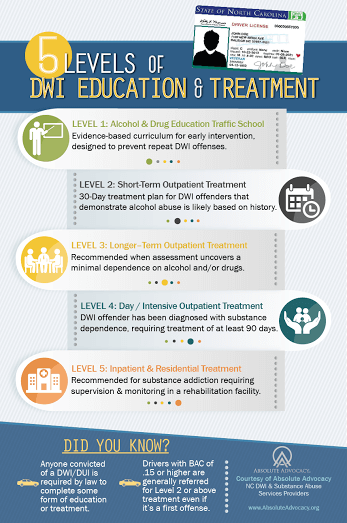What You Need To Know
Did you know, in North Carolina, a driver convicted of a DWI must complete both a substance abuse assessment and some form of education or treatment before his/her license is reinstated? In addition, if probation is given (as it is in essentially all DWI convictions), the court will require completion of an assessment and treatment as part of sentencing. The state also stipulates how much education or treatment is needed in order to satisfy this requirement. The levels of DWI substance abuse education and treatment are separated into 5 categories. The level that gets applied to a driver’s DWI case depends on several factors including:
- The driver’s previous history with impaired driving;
- Whether or not the driver refused any testing at the time of the arrest; and
- Information gathered during the DWI assessment.
The levels of treatment ranges from 16 hours of drug and alcohol education up to 90 or more hours of treatment. In order to meet the education and treatment requirements, the driver must see an approved DWI services provider who is licensed to conduct DWI assessments. The DWI substance abuse counselor will ask a series of questions (clinical interview) during the assessment. Based on the findings from the assessment, the provider will then place the driver into one of the following categories of service and criteria.
(1) Alcohol and Drug Education Traffic School (ADETS)
ADETS is a 16-hour alcohol and drug prevention educational course. Most first time offenders without a prior history of drug or alcohol abuse will fall into this category. ADETS is recommended when:
- The assessment did not identify a substance abuse handicap;
- The person has no previous DWI offense conviction;
- The person had an alcohol concentration of 0.14% or less at the time of arrest;
- The person did not refuse to submit to a chemical test;
- The person meets the admission criteria for early intervention.
(2) Short-term Outpatient Treatment
This level of service requires at least 20 hours of education over the period of 30 days, and is required when:
- The assessment outcome suggests diagnosis of psychoactive substance abuse only (meaning there is no evidence of dependence or addiction);
- Prior to the assessment, the driver:
– Had an alcohol concentration of .15 or higher at the time of arrest
– Refused chemical test at time of arrest;
- If revealed during the assessment, that the person has:
– Problems relating to family history of substance abuse;
– Other problems which seem to be a contributing factor to DWI behavior
(3) Longer-Term Outpatient Treatment
Long-term outpatient treatment is usually advised when the driver shows signs of drug or alcohol dependence. Dependence occurs when a person moves from the casual abuse or misuse of a substance to the physical need or reliance on the substance for daily function. (2) If during the assessment, the client meets the criteria for Level I of the American Society of Addiction Medicine (ASAM) placement criteria, which defines substance dependence, the assessment client’s level of service may fall into this category. Longer-term outpatient treatment requires a minimum of 40 contact hours over a minimum of 60 days.
(4) Day Treatment/Intensive Outpatient Treatment
Day treatment or intensive outpatient treatment requires minimum of 90 contact hours over a period of at least 90 days. This level of treatment is recommended when the assessment confirms a diagnosis of substance dependence beyond the scope of the longer-term treatment, requiring more advanced education and treatment to help the client overcome the dependence.
(5) Inpatient and Residential Treatment Services
When outpatient treatment has not been successful, and in cases where the client demonstrates any of the following characteristics, a minimum of 90 days of residential treatment in a recovery or rehabilitation center is advised along with a written continuing care plans beyond the 90 days.
- An addiction to a substance;
- Withdrawal risk;
- Need for medical monitoring;
- Emotional and behavioral problems requiring a structured setting;
- High resistance to treatment;
- Inability to abstain; and
- Lives in a negative and destructive environment
Each DWI case is different based on the unique history of each driver. It is important that anyone convicted of a DWI get the proper treatment and level of care he or she needs in order to prevent the dangerous consequences of drunk driving and substance abuse. This is why it is important to work with a qualified DWI substance abuse counselor that is skilled in administering DWI assessments. The right level of education or treatment can make all the difference.
Sources
1. NC GS 10a NCAC 27g .3813: Placement Criteria for Assessed DWI Clients
2. The Difference Between Substance Abuse vs Dependence vs Addiction, Absolute Advocacy
This guest post is provided by Absolute Advocacy, North Carolina DWI substance abuse professionals and DWI assessment providers. To schedule an assessment or speak to a substance abuse counselor in North Carolina, click here to contact Absolute Advocacy.
